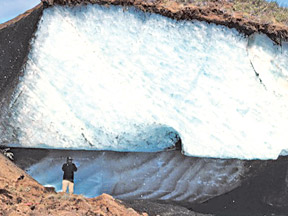|
Punch –
Environmental
Thawing permafrost may speed global warming
|

A third of the earth’s permafrost will be gone by 2200
|
Global warming could cause up to 60 percent of the world’s permafrost
to thaw by 2200 and release huge amounts of carbon into the atmosphere
that would further speed up climate change, a study released Wednesday
warned.
Using projections based on UN Intergovernmental Panel on Climate
Change (IPCC) scenarios, scientists at the National Snow and Ice Data
Center (NSIDC) in Colorado estimated that if global warming continues
even at a moderate pace, a third of the earth’s permafrost will be gone
by 2200.
If the planet warms at a faster pace, the world could see 59 percent
of the permanently frozen underground layer of earth thaw out; as that
happens, organic matter that has been trapped in the permafrost for tens
of millennia will begin to decay, releasing carbon into the atmosphere.
The NSIDC scientists then used a model to predict how much carbon the
thawing permafrost would release and came up with the staggering figure
of 190 gigatons by 2200.
“That’s the equivalent of half the amount of carbon that has been
released into the atmosphere since the dawn of the industrial age.
That’s a lot of carbon,” NSIDC scientist Kevin Schaefer, the lead author
of the study said.
AFP
Curbing soot could slow climate change
|

Existing greenhouse gas emissions cuts are insufficient
|
Strict curbs on soot and ozone air pollution would limit global
warming by 0.5 degree Celsius in a step toward achieving tough world
climate goals, a UN – backed study showed on Friday.
Stricter limits on “black carbon” soot and tropospheric ozone – a
greenhouse gas that is a big component of smog – would also clear the
air and so reduce human deaths and improve crop yields, especially in
Asia, it said. “Rapid implementation of proven emission reduction
measures would have immediate and multiple benefits for human
well-being,” it said.
Proposed measures include cuts in flaring of natural gas, curbing gas
leaks from pipelines and reducing methane emissions from livestock. Poor
countries should make wider use of cleaner-burning stoves, and
open-field burning of farm waste should be banned.
The study, backed by the UN Environment Program, the World
Meteorological Organization and the Stockholm Environment Institute,
will be reviewed by environment ministers from around the world during a
meeting in Nairobi from February 21 to 25. Full implementation of
proposed measures to clamp down on black carbon and ozone would reduce
future global warming by 0.5 degree Celsius, within an estimated range
from 0.2 to 0.7 degrees Celsius, the report said.
Reuters
|



